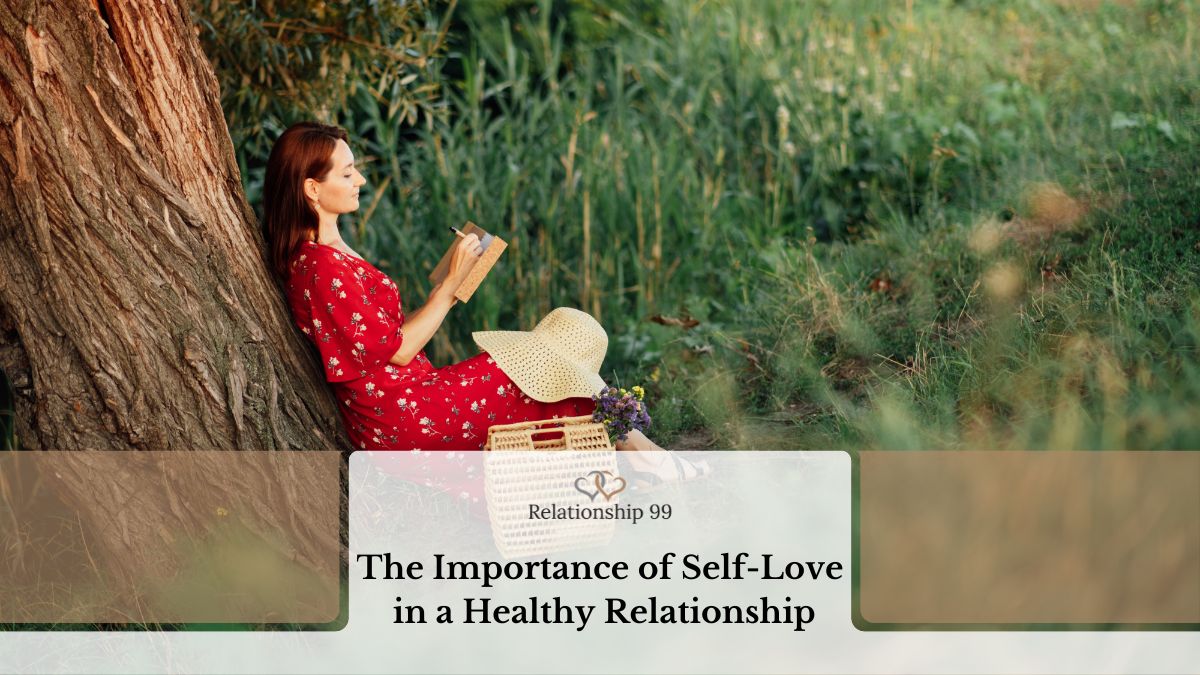When it comes to relationships, most people focus on loving and caring for their partner. While this is crucial in maintaining a healthy relationship, many forget the importance of self-love. In fact, self-love is the foundation for any successful relationship.
Self-love refers to having a positive and realistic view of oneself. It involves accepting and appreciating oneself, flaws, and all. Self-love is not about being self-absorbed or selfish but rather having a healthy sense of self-worth and confidence. In this blog, we will discuss why self-love is essential in a healthy relationship and how to cultivate it.

What is Self-Love?
Self-love is more than just a buzzword. It is the act of taking care of oneself mentally, emotionally, and physically. It means being kind to yourself, forgiving your mistakes, and prioritizing your well-being. When you love yourself, you are better equipped to love others. Self-love is not a one-time event; it is an ongoing process that requires constant attention and effort.
Why is Self-Love Important in a Relationship?
1. Healthy Boundaries
Self-love allows you to set healthy boundaries in a relationship. When you love yourself, you know your worth and what you deserve. You are less likely to tolerate disrespectful or toxic behavior from your partner. It also means that you will not compromise your values or beliefs for the sake of the relationship.
2. Independence
Being in a relationship does not mean losing your sense of self. Self-love promotes independence, where you maintain your own identity and interests outside of the relationship. This prevents codependency and allows you to continue growing as an individual.
3. Communication
Self-love means being honest with yourself and others about your needs and emotions. When you love yourself, you are more likely to communicate effectively in a relationship. You can express yourself without fear of judgment or rejection, leading to open and honest communication.

4. Mutual Respect
When you love and respect yourself, you are more likely to attract a partner who does the same. Self-love promotes mutual respect in a relationship, where both partners appreciate and value each other’s feelings, opinions, and boundaries. Moreover, self-love prevents one from seeking validation or approval from their partner, leading to a more equal and healthy dynamic.
5. Better Problem-Solving
Self-love means taking responsibility for your actions and emotions. In a relationship, this leads to better problem-solving skills as both partners take accountability for their part in conflicts. Instead of blaming each other, there is a focus on finding a resolution and moving forward.
6. Positive Influence
Lastly, self-love has a positive influence on your relationship. When you are happy and fulfilled in yourself, you bring that positivity and love into the relationship. This creates a healthy and supportive environment where both partners can thrive.
How to Cultivate Self-Love?
1. Practice Self-Care
Self-love starts with taking care of yourself. This can include anything from getting enough sleep, eating well, exercising, and engaging in activities that bring you joy. Taking care of your physical and mental health is crucial in building self-worth and confidence.
2. Positive Self-Talk
Pay attention to your inner voice and how you talk to yourself. Practice positive self-talk and challenge negative thoughts. Instead of criticizing yourself, try speaking to yourself the way you would speak to a friend – with kindness and understanding.
3. Set Boundaries
Know your limits and communicate them clearly. Setting boundaries shows that you value yourself, and it allows you to have healthy relationships with others.

4. Celebrate Your Accomplishments
Take the time to acknowledge and celebrate your accomplishments, big or small. It can be as simple as giving yourself a pat on the back for completing a task or treating yourself after reaching a goal. Recognizing your achievements boosts self-esteem and reinforces self-love.
5. Surround Yourself with Positive People
The people we surround ourselves with can greatly influence our self-perception and confidence. Surround yourself with people who support and uplift you rather than those who bring you down or make you doubt yourself.
6. Seek Professional Help
Sometimes, self-love may be difficult to cultivate on your own. Do not hesitate to seek professional help, such as therapy or counseling, to work through any underlying issues and learn how to love yourself fully.
7. Be Patient with Yourself
Self-love is a journey, and it takes time. Be patient with yourself and allow yourself to make mistakes. Remember that you are worthy of love and deserve to be treated with kindness and respect.
What Self-Love is NOT?
While we have discussed the importance of self-love, it is essential to recognize what self-love is not. Self-love does not mean being selfish or putting yourself above others. It also does not mean seeking perfection or having an inflated ego. Self-love is about finding a balance between caring for yourself and caring for others. It is about treating yourself with the same compassion and kindness that you would show to others. Here’s a list of what self-love is not:
- Egotistical
- Narcissistic
- Selfish
- Ignorant of others’ feelings and needs
- Seeking perfection
- Comparing yourself to others
- Self-pity or self-victimization
- Forgetting about others’ well-being
- Putting yourself above others
- One-time event
- Dependent on external validation
Affirmations for Self-Love

Affirmations are positive statements that you can repeat to yourself daily to help cultivate self-love. Here are a few examples:
- I am worthy of love and respect.
- I am enough just as I am.
- I am deserving of happiness and fulfillment.
- I choose to love and accept myself unconditionally.
- My imperfections make me unique and beautiful.
- I am strong, capable, and deserving of all the good things in my life.
- I forgive myself for any mistakes and grow from them.
- I am confident in who I am and what I have to offer.
- My self-worth is not dependent on others’ opinions or validation.
- I choose to prioritize my well-being and happiness.
In Conclusion
Self-love is essential for healthy relationships and overall well-being. It starts with taking care of yourself, practicing positive self-talk, setting boundaries, and surrounding yourself with positive influences. Remember that self-love is a journey, and it takes time to cultivate. Be patient with yourself and prioritize your own happiness and well-being. You are deserving of love – from yourself and others. So, continue to nurture and grow your self-love, and watch how it positively impacts all aspects of your life.

